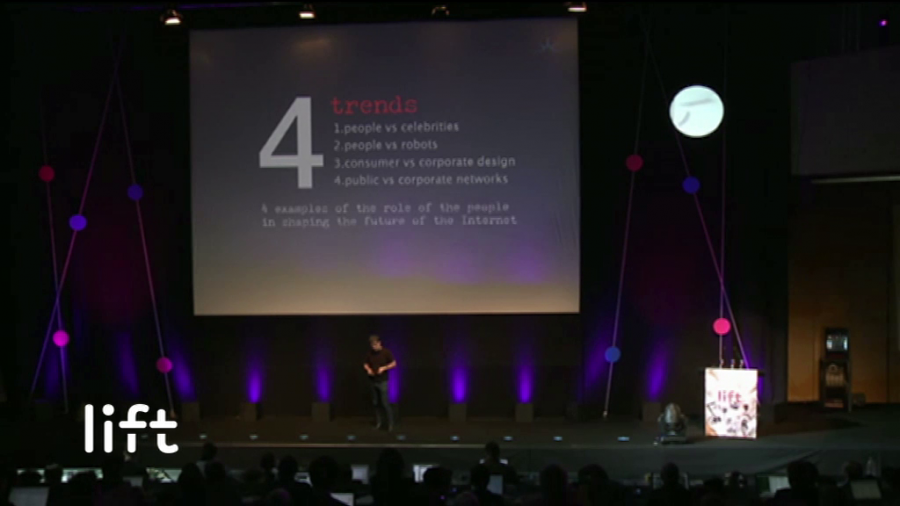I tried to pick four trends and put them in a theme, and the theme really is about people.
People vs Celebrities

Rudolph Valentino in The Sheik
So the first trend is really about celebrity, and if we look at this guy, he was the first real movie star. When he died in 1926, there was mass hysteria and 300 people were injured at his funeral. He was the prototype of what it is to be celebrity today, and this was just when movies had really been invented. So in 3,000 years of acting, this guy suddenly was more famous than any other actor has been in history. The reason for that is kind of obvious. He can be seen by millions of people in lots of movie theaters, whereas most people can only be seen previously in one theater.
But then the Web comes along and this idea takes root about the Long Tail, and it’s saying exactly the opposite. It’s saying that the little guys win, not the big guys, not the hits, not the celebrities. And this is the ultimate cliché slide in an Internet talk, to bring up the Long Tail, but the reason I’m bringing it up again is that I think it’s over. And that’s because it only went half-way. It looked at really what happens when you get a shop like Amazon and they stock everything. So of course you’ve got a niche market products and the niche stuff sells, and before you had a shop and they couldn’t stock everything so the niche stuff didn’t really sell.
So now you have infinite supply and that’s really what the Long Tail’s saying. It stops there. But celebrity does the exact opposite. When you’ve got infinite supply, the finite commodity is the complete reverse. The scarcity is demand. And to capture people’s attention, which is the new scarce thing, you need people who can capture attention. And think about the people who can capture attention. They’re celebrities.
And so some actual concrete examples of how this affects us, the celebrity effect is the way we’re made. When people looked at MySpace, it was very different from other types of social network because something new happened, and they found that some of the nodes were not the same as the nodes on other social networks. There were actually singers, basically.
And just like most songbirds are male and they will sing themselves to death to attract females and to show how good they are at collecting food, that they can afford to spend extra time singing, rock stars really are genetically what songbirds are. So when you have a newer social network like Twitter, Twitter has an asymmetric model that’s different from Facebook. If I follow Lady Gaga, she’s not going to follow me. So what that means is that everyone follows Lady Gaga and you get this tremendous effect of celebrity, and you’ve got the fact that these racks and racks of servers… You can imagine a giant server farm for Twitter, 3% of those racks are dealing with Justin Bieber.
“At any moment, Justin Bieber uses 3% of our infrastructure. Racks of servers are dedicated to him. — A guy who works at Twitter
— dustin curtis (@dcurtis) September 7, 2010
That allows the system to be gamed, and it hasn’t really been gamed yet, but people will learn how to game it. They will learn how to take what we’re calibrated to do when we evolved in the African savanna walking around in bands of 50 people, where the leaders of those people, the celebrities, were only communicating with 50 people. Now they can communicate with a billion people, so our risk model, the way we’re calibrated, is flawed, and that can be exploited. And that’s what marketing is, really.
So as an exercise to look at this in terms of numbers, Lady Gaga’s been very good at exploiting fame on the Internet. She’s not “Charlie Bit My Finger” or something like that, she’s a real celebrity. And if you look at how much she’s been downloaded on YouTube and you average say, it’s 5 megs a video or whatever, that equates [to] about 10 petabytes. Now let’s say we take that and we look at it charged the same as SMS which can be 15 cents for 140 bits, how much would Lady Gaga have to pay Google if she did actually pay for the bandwidth that she used? Well, the answer is $10.5 trillion. It’s a very big number. So the Internet’s a giant game of follow the leader in that sense. And the Long Tail starts to reverse as marketing takes over.
People vs Robots
The second trend, really big trend, is people vs. robots. And robots here are represented by Google. Google is quite a nerdy company, and it deliberately tries to be nerdy. That’s their image. They try and take the algorithm and make it something that’s very core to what they do. For example, when I was working on a new search engine, what Google did was they decided they were going to copy it but they weren’t going to use editors, and they spent an enormous amount of money to try and make a system that had no editors that was just done by machines.
You’ve seen a marketing ploy recently. They created a car without a driver. This is a dumb idea. Okay, it’s a marketing thing, but it’s symbolic of Google [having] an ideological attachment to the algorithm.
So when you ask Google a very simple question like, “Can you recommend me a good sushi bar?” You get basically human beings put through a meat grinder and an opinion churned out that—this might be via Yelp or might be whatever—but essentially in the search results you’re getting an algorithmic result. You’re getting something that ultimately distills something down to a number.
There’s a big existential threat for Google, which is Facebook. Facebook is about people, and it’s about a social network. And if you ask Facebook (you cannot do this at the moment; they don’t have a revenue model that’s based around this) but it’s potentially much more valuable… Basically, you could ask Facebook, “Can you recommend me a good sushi bar?” I have a good friend who’s obsessed with sushi. If I ask him, he’ll tell me and it’s a nuanced opinion. I know exactly what he’s talking about and frankly it’s not an algorithmic result. It’s not fifty frat boys who’ve reviewed a pizza joint and I don’t really know what it’s about. It can be much more valuable. It’s about real people.
And the reason that’s important is because I have a relationship with these people that’s separate, that’s offline, it becomes unspammable. Google know this. They’re spending millions on it. They’re spending millions on maps and local. But they’re stubborn and they don’t own the social graph. So when they put blended results through local results at the moment, because they don’t own the social graph, they’re kind of screwed. So the trend that I’m picking out here is that I think recommendations are starting to go to real people. The algorithm’s going to have a temporary respite.
People powered design
The third trend is a bit more abstract but it’s something I know about because I used to be an architect. It’s about how design for personal technology actually changes things and makes them better. This quote’s from Andy Warhol. He was looking at America and saying America’s different. He’s saying, “Well, Elizabeth Taylor’s drinking Coke and I’m drinking Coke and the bum on the street’s drinking Coke, and it’s all the same thing.” For the first time in history, mass market culture has allowed us all to enjoy the same thing. This is not champagne. The bum on the street can’t afford champagne.
But consumer technology goes further because it allows everyone to drink champagne because of the way it works, and it creates products that are actually better than the pro ones. A simple example, and this is not a new one and it’s kind of been corrected, but on Outlook you were searching your own email and it would take seconds to return the results. Then you search the whole world’s documents, 18 billion documents, and it comes back in 0.3 seconds. And it’s free. This is a better product.
So why is that? Well, one reason is low marginal cost. When you look at this, this is not to do with the hardware, because the Vertu is basically a cheap phone in a gold case, and the iPhone is about the software. There’s very low marginal cost. So five hundred bucks for millions of people is a greater amount of money than twenty-thousand bucks and the world population of gangsters.
So how does that mechanism work? Well, from architecture…this is a bit nerdy but I think crucial to the way it works, is that an architect filters features. They take you brief, you say, “Oh I want a building and I want a room that does this and this and this,” and the architect throws out some of those features. And the difference between architecture and building is that a building, you just pass the features to the contractor and he builds it. There’s no interpretation of that. And when I went to Silicon Valley I was horrified that I realized—I thought, “Oh, I’m going to call myself Chief Architect,” and everyone looked at me as if I were a loser that I wanted this title because it’s not a standard title. You were called VP of Marketing or CTO if you were doing a startup.
And until recently, software wasn’t designed. The product marketing guy would pass the stuff straight to the engineering department and they would build it. But the Internet’s changing that. And it’s changing that because people fundamentally have more personality than corporations, by definition. It leads to better products.
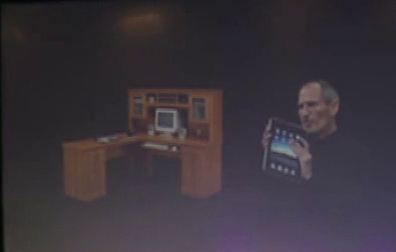
So that vision on the left is basically the vision we had of computing that was driven by small business software. It’s a near-Victorian workstation. The vision on the right of course is what we have now. It’s fabulous.
So it’s not about features. That’s a cheap hi-fi with lots of features. [slide not visible] It’s about design. That hi-fi is 40 years old. It has very few features, but it sounds great:
So personal technology allows good design to apply to the process itself by separating the mission-critical from the personal. The Space Shuttle has a 386 chip. It’s decades old. It’s completely bug-free now. But it’s not actually useful for what people have to do up there, so they take their own laptops up there. That’s fine. They’ve separated the mission-critical from their own personal stuff. You’re not going to want to run the life support system on their laptop because if you get a Blue Screen of Death, that’s a problem. But, you can run the other stuff that you might be doing up there.
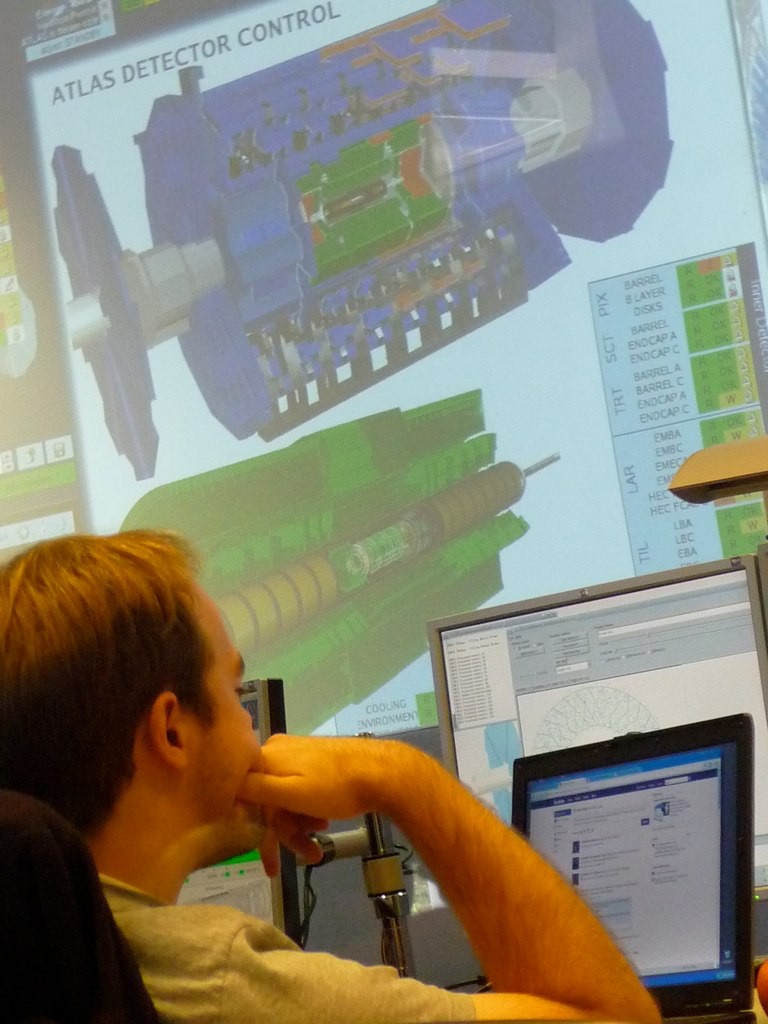
Image via David Galbraith/Flickr
And that happens closer to home. If you look here, this is the ATLAS control room at CERN and the guy’s actually looking at Facebook, probably like quite a lot of you now. But it doesn’t matter because they’re separating the mission-critical from the personal, and this is driven by design, fundamentally.
Public vs Corporate Networks
The last point is about networks and the way they’re made, about why the hell is this bizarre thing, this super fabulous science-fiction‑y thing which is having a video conference… This is what was in the film 2001. It’s free. Why the hell is that free, and why when I phone my wife does it cost up to fifty cents a minute? Something is wrong there.
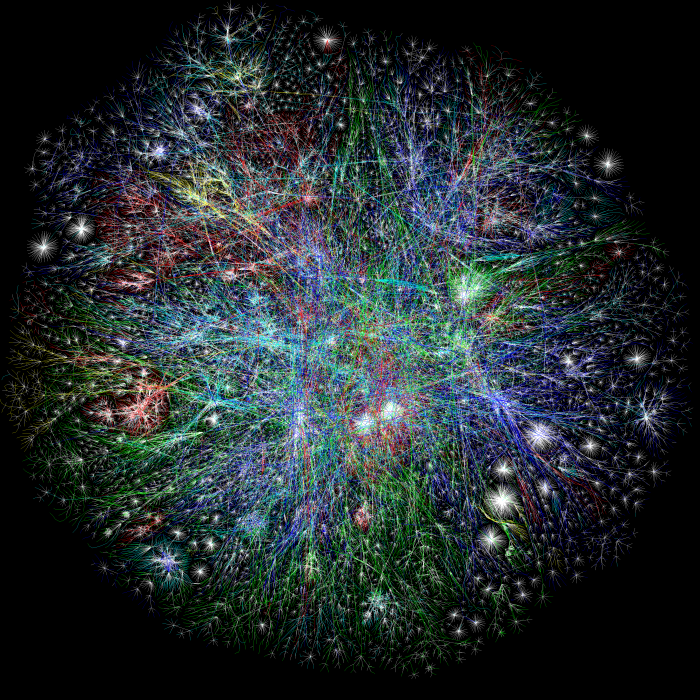
“The Internet 2003” via The Opte Project
And it’s to do with the way the infrastructure of the Web works. That map there is actually a diagram of— It’s a bit like the London Underground map. It shows how information routes but it doesn’t show actual distance. Whereas the actual infrastructure of the Web looks something like that:
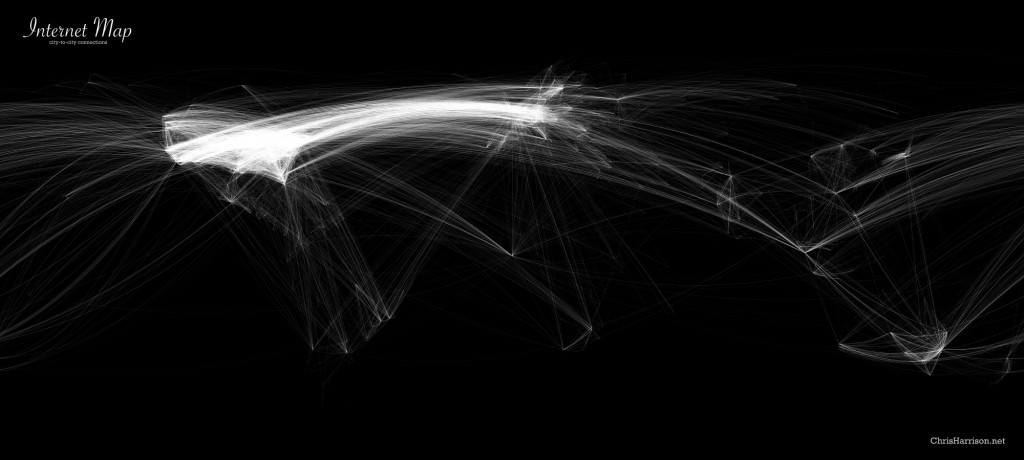
Chris Harrison, Internet Maps, “World City-to-City Connections”
And that’s why, largely, you can unplug Egypt like you unplug a vacuum cleaner. Because there are very few ISPs going there and they can change the routing tables for a very few providers. You can disconnect that. Burma was just disconnected before. Nepal was disconnected before. All for civil unrest. That’s why the Chinese government concluded it’s not a threat. The Internet’s not a threat to them. For all we talk about and want to believe this positive story that there’s going to be a Twitter revolution, etc., the revolution either will or will not work, and yes there will be a role with that. But also remember that the Internet is not FidoNet. It’s not a truly unstoppable network. Governments can unplug it.
So back to the main point which is this playoff between networks and what it’s going to mean for us, is that the Internet’s like a road network. Most of it’s free and you make money along the side like Google, etc. But the phone system is like a railway. You paid as you used it. And they’re really in conflict with each other, and the problem is that they run over the same thing. So you’ve basically got a car running on rails. You’ve got something that’s incongruous.
And what’s happening is that’s been ignored. That’s why your Skype call’s free, because it’s been ignored for a while. But video is creating a reason for this not to be ignored anymore. And it’s a big problem.
So going back to the Lady Gaga example, just to show you the difference in video to messaging, what is the difference in the value per bit, the revenue per bet, that’s generated? If we say ten bucks CPM impression for a video, and it’s 40 megabits per impression, 140 bits for an SMS message again (okay, SMS, let’s say “tweet” for that), well the revenue is about 10-9 or 10-10 for the video bits, but for the SMS bits it’s about a thousandth of a dollar. So you’re talking about a 25 million difference in the value.
You’ve basically got bits that are flying around where the carrier is told in net neutrality that they can’t charge a different amount for the bit, but there’s a 25 million to 1 ratio difference in the value that there is in that thing.
So what happens of course is messaging, we’ve been fleeced for years. With messaging, with SMS, it’s ridiculous it costs so much. But at the same time, video is really crippling these guys. And they’re not getting the revenue for it. So you can see both sides of the argument. But it’s a trainwreck. Something really bad is going to happen here because fundamentally, two business models are colliding.
So what are the options? You have government control, so you subsidize the Internet. It doesn’t need to be government. The government might supervise non-profits, etc. or they tell the ISPs what to do. Or you have two Internets, because what will happen is if the video’s swamping the normal Internet, corporate message networks will say, “Well, we’ll put just our messaging stuff without the video stuff and we’ll build a separate Internet.” And the third thing is that then they decide, “We’re going to prioritize bits differently,” in which case net neutrality’s dead, and that’s actually a really big deal.
So these things sound very nerdy, but they’re super important. This is the background of how things like unplugging the Internet in Egypt plays out. It’s to do with the way the network works. Who owns it? What does it evolve like in future? So this trend seems really banal. It’s the last thing I’m saying and it seems really trivial to say, “Well, there’s no more all-you-can-eat data,” but really that’s what’s important. We’ve talked about the fact that you can do whatever you want on the Internet and it’s all you want. That’s really important. So if what’s happening… Most of you if you have a phone you might know that if you start watching video movies on your phone, the bandwidth starts getting throttled, it becomes a really really big deal if that plays out into the sphere of what’s happening around the world with not being able to voice data forever. So, that’s it.
Further Reference
This presentation at the Lift Conference video archive, and its description [Wayback].
